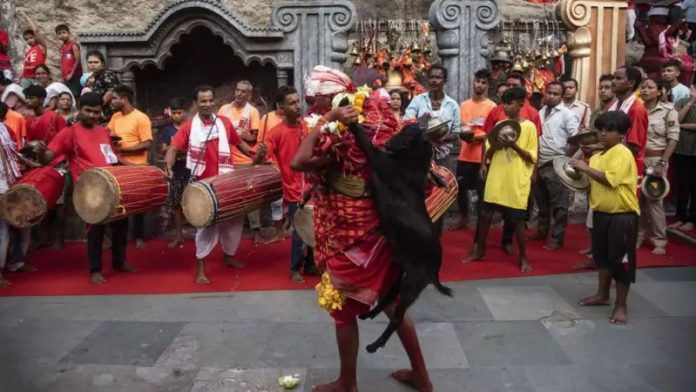During the recent Devadhani festival at Assam’s Kamakhya Temple, a striking scene unfolded as a priest performed a traditional dance with a sacrificial goat. This ritual, deeply rooted in cultural and religious practices, captivated the attendees with its vibrant and symbolic display.
The Devadhani festival, celebrated with fervor and devotion, sees such rituals as integral to invoking divine blessings and ensuring prosperity. The rhythmic dance of the priest, accompanied by chants and drum beats, highlighted the rich cultural heritage and spiritual significance of the event, attracting devotees from across the region.
Eid al-Adha: A Festival of Sacrifice, Charity, and Community Welfare
In contrast, Eid al-Adha, the Islamic Festival of Sacrifice, embodies the values of devotion, charity, and communal support. This festival commemorates the willingness of Prophet Ibrahim to sacrifice his son Ismail in obedience to Allah’s command, symbolizing ultimate faith and submission.
During Eid al-Adha, Muslims around the world engage in Qurbani, the sacrifice of an animal, with the meat distributed among family, friends, and those in need. This act of charity ensures that even the less fortunate partake in the festive joy, fostering a sense of community and support. The festival also stimulates economic activity by involving various sectors such as livestock, retail, and food industries, creating job opportunities and boosting the economy.
Islamic traditions also emphasize the dignity and humane treatment of sacrificial animals. This includes practices such as sharpening the knife to minimize the pain and suffering of the animal during the sacrifice, reflecting a deep respect for life and compassion.
Islamophobia and the Question of Secularism
Despite the positive contributions of Islamic festivals, there is a persistent issue of Islamophobia and prejudice against Muslim practices. This bias is particularly evident when Islamic traditions are subjected to undue scrutiny and regulations, while other religious festivals are celebrated without question.
India prides itself on being a secular nation, yet the promotion of one religion over another and the negative portrayal of Islam contradicts this principle. True secularism should ensure equal respect and freedom for all religious practices, without discrimination.
Muslims should continue to uphold the values of charity, economic support, and community welfare that their festivals represent. By demonstrating the true essence of Islam through actions, they can challenge misconceptions and promote a more inclusive and understanding society.
In light of global and local challenges, it is important to make dua for brothers and sisters facing hardships, particularly in Palestine, and pray for better circumstances for Muslims in India and worldwide. Collective efforts towards charity and community welfare can contribute to a more just and compassionate world.




